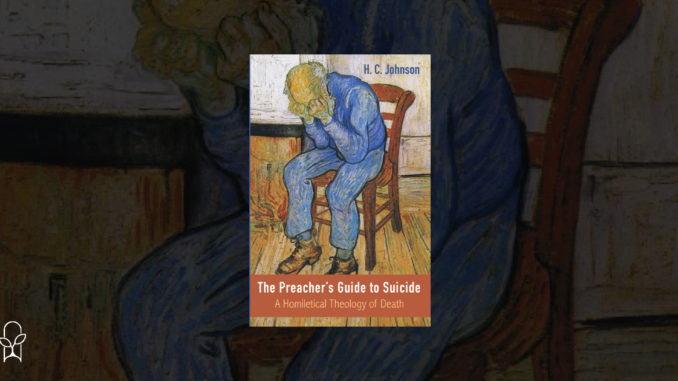
Published by Resource Publications on March 18, 2022
Genres: Academic, Non-Fiction, Theology
Buy on Amazon
Goodreads

This book makes the startling claim that the pulpit is the appropriate place to address suicide. In A Preacher’s Guide to Suicide Johnson chisels through the rusty prison bars of cultural pretense and the oppressive myths of suicide. Using history, the social and behavioral sciences, and biblical inquiry over the centuries of varied Christian voices, Johnson demonstrates that suicide is part of the very fabric of Christian identity. And to preach suicide awareness is to preach life into the very act of dying. While grappling with the contemporary understanding of neuroscience, psychopathology, societal values, and individualism, Johnson seeks to present suicide in a hopeful light as we all approach death in those daily moments of confession, forgiveness, and prayer. Johnson hopes to provoke further conversation within the Christian community about the richness of suicide within the Scriptures and seeks to be a source of inspiration for preachers.
Everyone has likely had their lives touched by suicide at some point in their lives. Yet, in my personal experience, clergy are often unprepared and unsure how to handle a death in that manner. For the old who died a natural death, we celebrate a life fully lived. For the young who died from disease or from accidents, we lament a life cut off too soon. But it feels different when the death was purposeful and when it was self-inflicted. For generations, suicide was seen as shameful and irredeemable. You didn’t talk about it. You hid from it. Clergy railed against it as sin in order to dissuade against it. In modern times, we understand more about the mental illness that often comes with suicide. We understand the feelings of pain, loss, and depression that often accompany that decision. But are we any better at dealing with it?
I did not get from The Preacher’s Guide to Suicide what I thought I was going to get. Focusing on the homiletical, rather than the pastoral, H.C. Johnson leads readers into a rather academic and philosophical treatise on suicide as a phenomenon. Readers go through the history of suicide and how cultures have reacted to it. Johnson has a chapter on the theology of death, that muses about what the concept of death even means from a medical standpoint. There are Christological reflections on martyrdom as a type of suicide and Christ’s sacrificial death as the pinnacle of that. All of this culminates in the book’s conclusion where she proclaims that “The preacher does not just preach on suicide but rather the act of preaching, in the Spirit, is suicide.”
This is said with the analogy of dying to self and living for Christ, but the structure of the book and its conclusion just don’t sit well with me. In treating suicide in this academic, distant, theologized fashion, Johnson keeps the pastoral element at bay—something that must shine through even in the preaching element. That is, the pastor does not cease to be a pastor when they preach. There is little here to comfort a family grieving the loss of a loved one. There is little on how to mitigate suicidal thoughts within one’s congregation. There is nothing on how to counsel those with suicidal ideation. Johnson does criticize preachers who condemn suicide from the pulpit or are insensitive to those who have lost loved ones to suicide, but her blueprint for an alternate vision is unclear.
Perhaps I was disappointed in this book because it wasn’t what I wanted it to be. That’s not a good reason to be critical of a book. But I read this just after a suicide affected the small community in which I serve and I did not find healing in this book or discover how to bring healing and hope to others. Maybe different circumstances would have enabled me to look at The Preacher’s Guide to Suicide more objectively. Maybe if not weighed down by the emotions of a recent loss, I would have felt differently about this book. But, if this book cannot help in the wake of suicide, what good is it?
There is a lot of value to this book. I appreciate it from an academic perspective. Johnson challenges us to rework our thoughts on suicide and suicide prevention. She offers an exhaustive review of suicides in Scripture that is beneficial from a theological and homiletical standpoint. She exposes harmful ideologies and uninformed approaches toward dealing with suicide. I just never felt like she rebuilt something amid the rubble and made it her own. This isn’t a bad book, Johnson’s scholarship is to be commended, but I wouldn’t call this a preacher’s guide to suicide.
